Searching for the best vitamin D supplement for your baby can be overwhelming. With so many options available, it can be difficult to know which are most suitable and safe.
Fortunately, moms everywhere trust these recommended baby Vitamin D drops to keep their babies healthy and strong. Whether you're looking for an easy way to administer Vitamin D or just want to make sure your baby gets enough vitamin D, we've got you covered! Here's a look at the 5 best Vitamin D drops for babies on the market today.
We hope you find your ultimate best product from the list below! Each product was independently selected by our editors. Some may have been sent as samples for us to fiddle with, but all opinions in this article are our own. Oh, and FYI — ConsiderateChoices may collect a share of sales or other compensation from the links on this page if you decide to buy something (that's how we stay in business). Reviews have been edited for length and clarity. Enjoy finding the ultimate best for you!
How We Choose The Best Baby Vitamin D drops For Your Little One.
Choosing the best vitamin D supplements for infants is a top priority for us. We take into consideration safety, effectiveness and convenience when making our selections.
Before choosing products we look at clinical studies to determine any potential side effects, we consider manufacturer quality and reviews, as well as ensuring that forms of administration are compatible with infants' sensitive bodies.
This way, moms can rest assured their little ones are getting the nutrients they need without having any worries about potential danger or adverse reactions.
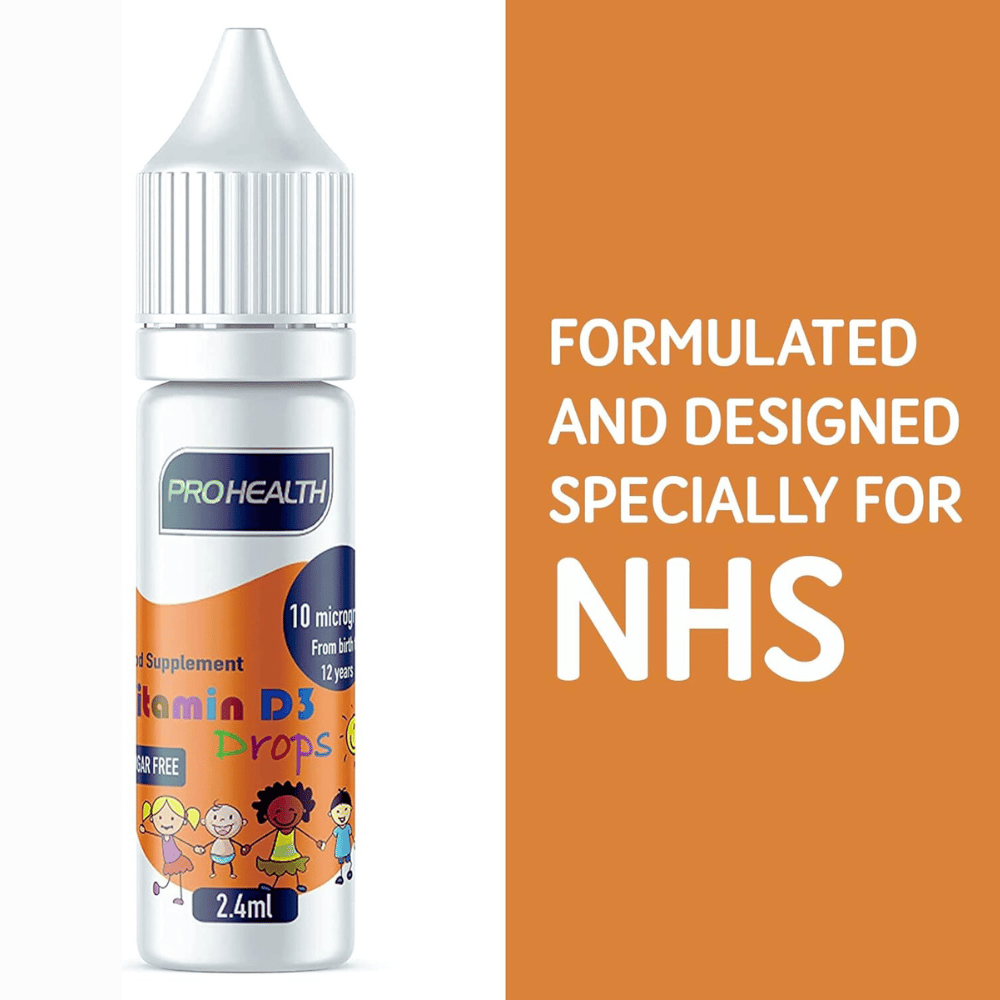
Supporting Bone and Teeth Development. Formulated for NHS
PROHEALTH Vegan Baby Vitamin D3 Drops
What Makes It Special
Meet the PROHEALTH Vegan Baby Vitamin D3 Drops - a tiny drop packed with a big punch for your little one's health!
Formulated to NHS guidelines, this bottle contains 120 drops of 10µg each, providing a four-month supply to support the growth journey of infants and young children.
What sets it apart? Well, it's not just vitamin D3 drops. It's a commitment to your baby's health.
These drops are vegan, non-GMO, and allergy-friendly, ensuring they're safe and suitable for all kiddos.
They contain no preservatives and have no taste, making them a fuss-free addition to your child's diet.
From supporting bone and teeth development to fortifying the immune system, these Vitamin D3 drops are here to give your baby a strong start in life.
With PROHEALTH, you're choosing more than a product; you're choosing peace of mind.
What's Also Good to Know
Looking for a high-quality vitamin D3 supplement for your little one? Look no further than PROHEALTH Vegan Baby Vitamin D3 Drops!
Made using only natural and plant-based ingredients, this product is perfect for parents who want the best for their child's health and well-being while also respecting their dietary requirements.
Plus, it's allergy-friendly, non-GMO, preservative-free, and suitable for vegan, halal, and kosher diets, making it a great choice for families with a range of dietary needs.
With ISO 9001, BRCG, and HACCP certifications, you can trust that this supplement is manufactured to the highest standards possible and that all ingredients are fully traceable.
So why wait? Give your baby the vitamin D they need to thrive with PROHEALTH Vegan Baby Vitamin D3 Drops!
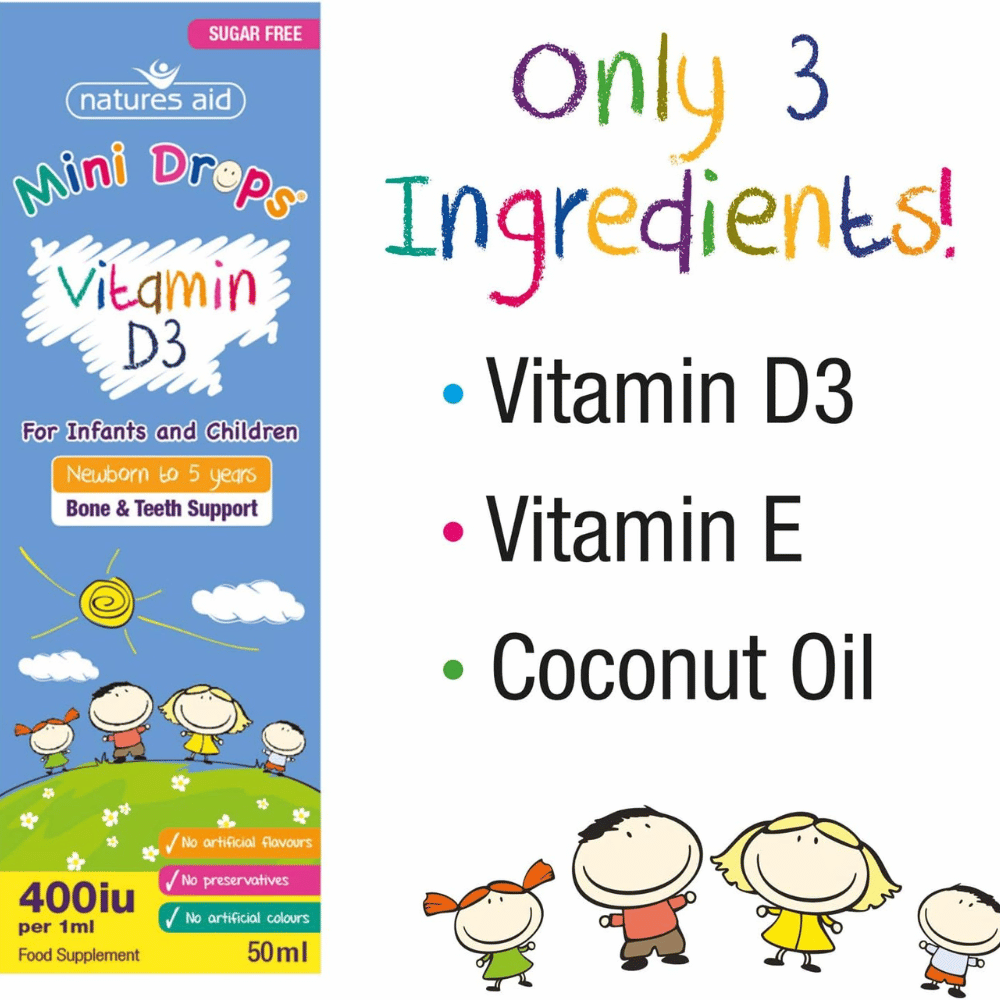
Supports the Maintenance of Normal Bones, Teeth and Immune Function
Natures Aid Vitamin D3 Mini Drops for Infants and Children, Sugar Free
What Makes It Special
Introducing Natures Aid Vitamin D3 Mini Drops for Infants and Children - your award-winning ally in maintaining your little one's health journey!
These sugar-free drops make the daily dose of health not just necessary, but also fun.
Each drop provides the daily recommended amount (400iu) of Vitamin D, perfectly tailored to support the maintenance of normal bones, teeth, and immune function. But what makes these drops stand out?
They're not just any vitamin supplement; they're a testament to Natures Aid's commitment to quality and care.
Honoured with awards, these drops are proof that you can provide essential nutrients to your child without compromising on their dietary needs.
So, with Natures Aid Vitamin D3 Mini Drops, you're not just promoting health; you're choosing a product that respects and nurtures your child's overall well-being.
What's Also Good to Know
As parents, we want to ensure that our little one is receiving all the necessary vitamins and minerals for healthy growth and development. That's where Nature's Aid Vitamin D3 Mini Drops come in!
Designed specifically for babies, infants, and children up to 5 years old, this easy-to-use liquid can be added to any food or drink for a hassle-free way of supplementing your child's diet.
With vitamin D3 being essential for healthy bones and teeth, as well as a strong immune system, you can have peace of mind knowing that your little one is getting the nutrients they need to thrive.
Plus, the mini drops format makes it easy to take on the go, so you can always ensure your child is getting the proper nutrition no matter where life takes you.
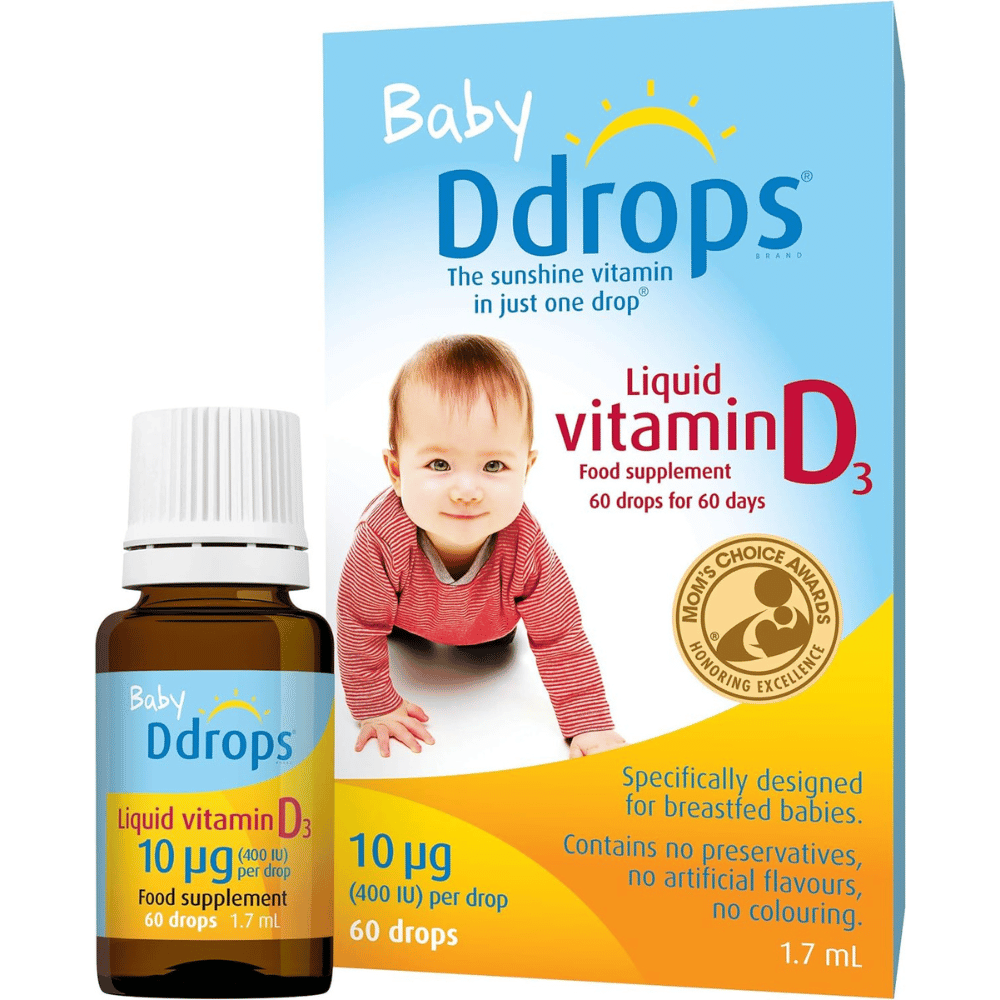
Specifically Designed for Breastfed Babies
Baby Ddrops 10 µg 60 Drops - Daily Vitamin D3 Supplement for Infants and Young Children
What Makes It Special
Welcome to the world of Baby Ddrops 10 µg 60 Drops - your child's daily Vitamin D3 boost! Crafted specifically for infants and young children, this supplement ensures your little one gets their essential daily dose of Vitamin D3.
But what sets Baby Ddrops apart? It's the thoughtfulness in every drop. With a simple, one-drop application, you can easily administer the right amount, avoiding any unnecessary fuss.
Each bottle offers 60 servings, providing ample supply to support your child's bone, teeth, and immune system health.
Baby Ddrops isn't just about the vitamins; it's about giving your child the best start in life, one drop at a time.
What's Also Good To Know
Hey there parents! Are you looking for a daily vitamin D3 supplement that is easy to use and made with natural ingredients? Look no further than Baby Ddrops!
With just one tasteless drop, your little ones will get their recommended daily dose of 10 µg (400 IU) of pure vitamin D3, which helps with bone health and immune function.
Plus, you can feel good knowing that Baby Ddrops is made with only two naturally sourced ingredients: vitamin D3 and fractionated coconut oil. Give your child the gift of health with Baby Ddrops!
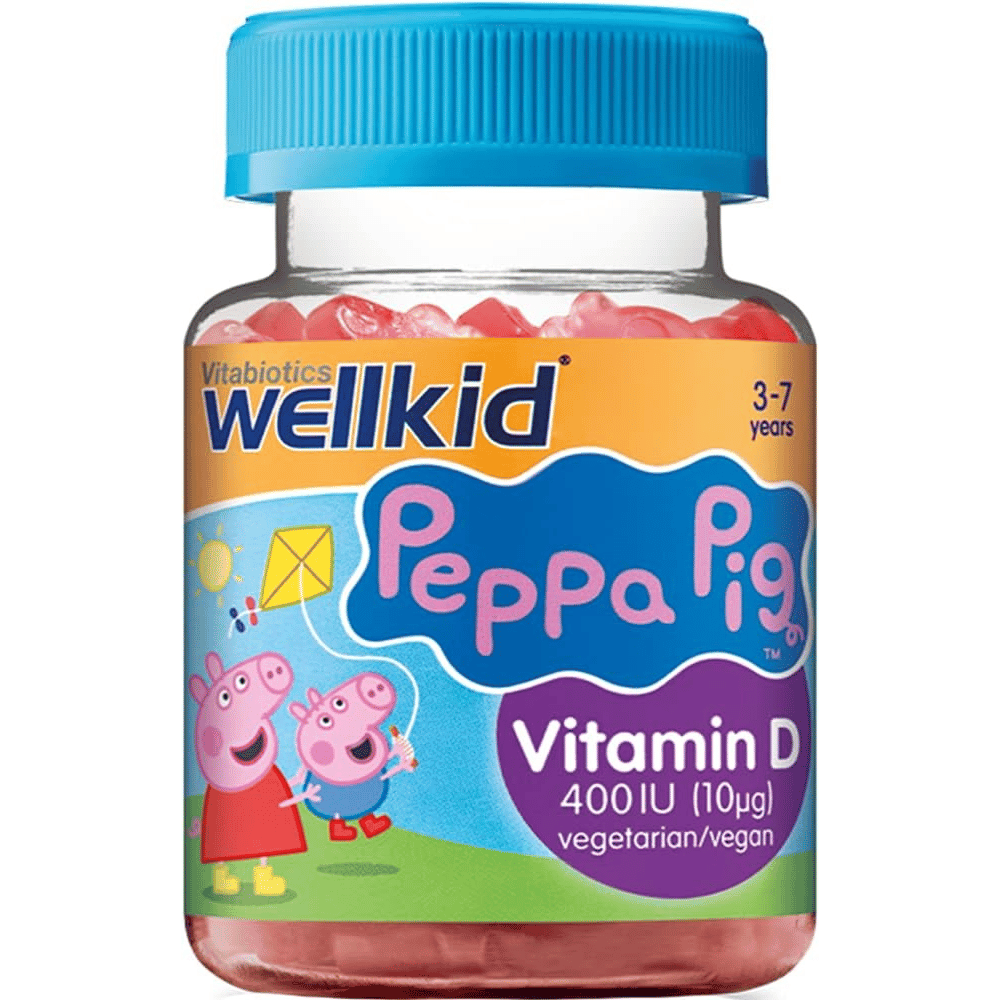
Helps Maintain Health, Vitality and Well-being in Growing Children
Vitabiotics Peppa Pig Vitamin D Soft Jellies, Gummy
What Makes It Special
Say 'Hi!' to Vitabiotics Peppa Pig Vitamin D Soft Jellies - the fun, tasty, and health-boosting treat your kids will absolutely love! What's so special about these gummies, you ask?
Well, they cleverly combine nutrition with delight. They come in the adorable shape of everyone's favourite character, Peppa Pig, making vitamin intake a fun and exciting part of your child's day.
Each gummy is filled with the recommended daily dose of Vitamin D, vital for supporting healthy bones, teeth, and immune systems.
Plus, their yummy flavour ensures your little ones look forward to their daily vitamins.
With Vitabiotics Peppa Pig Vitamin D Soft Jellies, you're not just providing a supplement; you're turning health into a joyful adventure!
What's Also Good to Know
Are you worried about your little one's vitamin D intake? Look no further than Vitabiotics Peppa Pig Vitamin D Soft Jellies!
These gummy jellies are specifically produced to meet children's needs, delivering just the right amount of vitamin D for kids aged 3-7 years.
And the best part? They come in a natural strawberry flavour that your child is sure to love.
Say goodbye to the struggle of convincing your little ones to take their vitamins and hello to a tasty and easy solution.
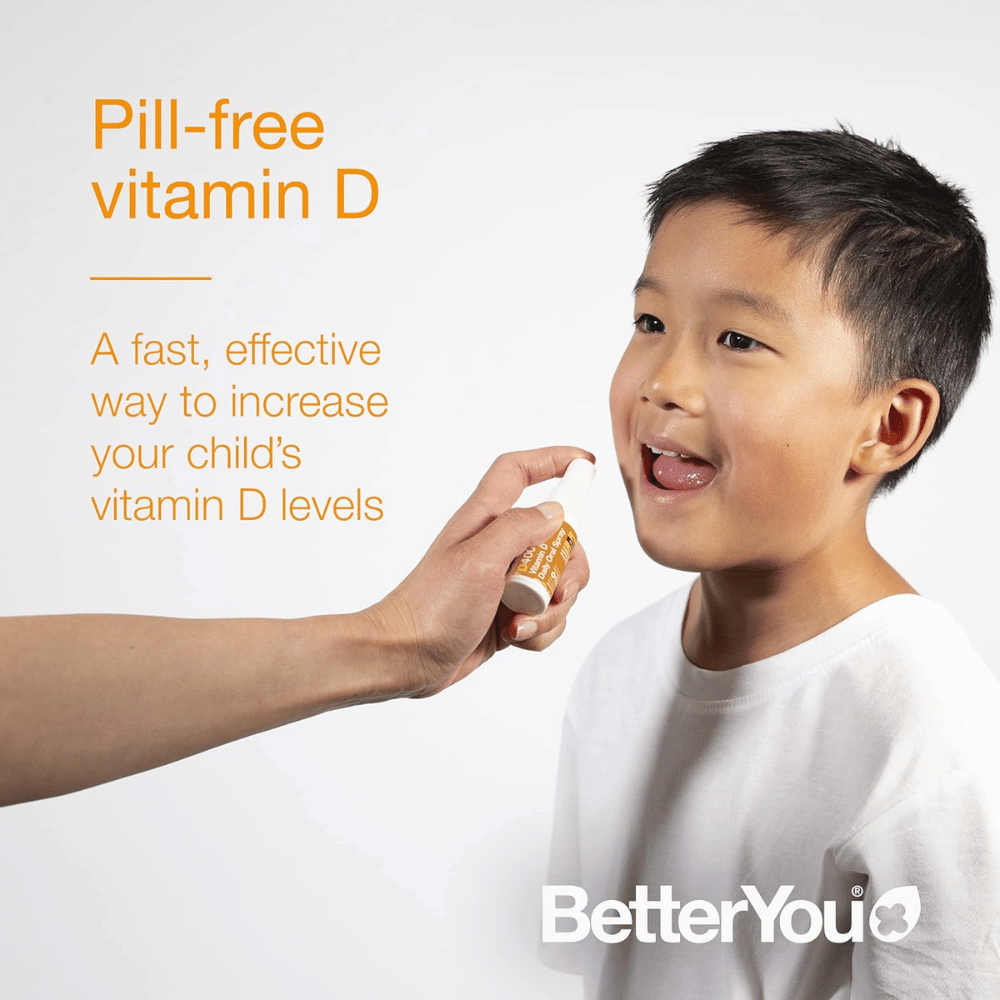
Supports the Immune System and Bone and Teeth Development
BetterYou Vitamin D 400 IU Junior Daily Oral Spray
What Makes It Special
Meet the BetterYou Vitamin D 400 IU Junior Daily Oral Spray, a revolution in children's health supplements! What sets this product apart? It's all in the spray.
This fantastic product ditches traditional pills and gummies for a quick, easy-to-use oral spray that kids love.
Each spray delivers a precise dose of Vitamin D3, crucial for supporting children's bone health, teeth, and immune systems.
But it's not just about what's inside. The spray application makes it a breeze for parents to administer and a fun experience for the kids. Plus, it's perfect for children who have difficulty swallowing pills.
With BetterYou Vitamin D 400 IU Junior Daily Oral Spray, you're not just giving your child a vitamin supplement; you're making their daily health routine effortless and enjoyable.
What's Also Good to Know
Hey, parents! Let's talk about BetterYou Vitamin D 400 IU Junior Daily Oral Spray. This is a fantastic supplement for children aged 3 years and above, and I'm sure your little ones will love it!
The best part is that it's pill-free, making it easy for your children to consume. This specially formulated Vitamin D3 spray is made with food-sourced ingredients and natural preservatives, making it a healthy choice for your child.
With just a few sprays a day, your kids can get the Vitamin D they need to keep their bones and healthy growth in check.
Sounds great, right? So, why not give BetterYou Vitamin D 400 IU Junior Daily Oral Spray a try? Your kids will thank you for it!
Baby Vitamin D Drops FAQs
Many parents are unsure about whether or not they should give their baby Vitamin D supplements.
It's natural to have questions about something as important as your child's health. You want to make sure you're giving them the best possible start in life.
Here are the most frequently asked questions FOR BABY VITAMIN D DROPS. This will help you decide if vitamin d drops are right for your baby and answer any other questions you may have.
Are Vitamin D Drops Necessary for Newborns?
Yes, vitamin D drops are an important supplement for newborns. During the first few months of life, breastfed babies rely on their mother's milk or infant formula as a source of nutrition.
However, studies have shown that neither of these provides adequate levels of vitamin D, which is necessary for healthy growth and development.
Vitamin D helps keep bones and teeth strong by enabling the body to absorb calcium from food sources.
It also supports a baby’s immune system by helping regulate inflammation in the body and aiding in the production of T-cells — white blood cells that protect against infection.
Furthermore, research shows vitamin D may even play a role in brain development as it regulates genes responsible for neurological pathways relevant to learning and memory.
Since babies aren't able to get enough Vitamin D through milk or formula alone, parents should give their newborn infants 400 IUs (international units) daily via supplementation until they are able to get enough through sun exposure or diet once they reach 12 months old or later depending on where you live since UVB rays vary depending on latitude.
Make sure you discuss supplementation with your child's paediatrician before making any decisions about vitamins - there are other supplements recommended by doctors apart from this one so make sure everything is set up properly!
Can A Newborn Overdose On Vitamin D Drops?
The short answer is yes, a newborn can overdose on vitamin D drops if they are given too much. It's important to follow the dosing instructions listed on your infant’s vitamin D supplement and not exceed the recommended dose.
Vitamin D plays an essential role in helping infants get adequate nutrition and promoting healthy bone growth, especially during their first year of life when bones are growing quickly.
Vitamin D supplements are typically used to prevent or treat rickets (a softening of the bones due to an extreme deficiency). Because of this, it's recommended that all newborns take some form of supplemental vitamin D within their first month.
For this reason, it’s extremely important for parents to strictly adhere to dosage instructions provided by their paediatrician or pharmacist when administering any type of vitamin supplementation to newborns—too much can be dangerous!
Can Vitamin D Cause Gas in Newborns?
It is possible for vitamin D supplement intake to cause gas in newborns. Vitamin D plays an important role in the absorption of fat-soluble vitamins, like A and E, as well as minerals like calcium, zinc and phosphorus.
When babies ingest more vitamin D than they need through supplements or fortified foods such as formula or cereal, it can cause their intestines to produce extra gas.
Gas pain is usually worse around feedings because babies are swallowing air during drinking from bottles or breastfeeding—and this air ends up trapped in their tiny bellies!
In addition to this, all infants have immature digestive systems resulting in poor digestion of food which leads to fermentation of food particles by naturally occurring bacteria; this process results in trapped gas bubbles within their intestines causing gassiness over time even without the increased levels of Vitamin D present due to supplementation or fortified foods.
If you suspect your infant may be having difficulty tolerating any supplementations including Vitamin D (or anything else), please consult your doctor before changing your infant’s diet/regimen further so that they can properly evaluate whether there may be actual intolerance at play rather than simply passing common gassiness issues typical amongst any newborn baby with an immature digestive system!
Is Vitamin D Passed Through Breast Milk?
Yes, vitamin D is passed through breast milk. It is an essential vitamin for infants and plays a key role in our bodies’ calcium regulation. Vitamin D helps absorb calcium from our diets to promote healthy bones and teeth, as well as healthy growth and development in children.
Breast milk contains a form of vitamin D called cholecalciferol, also known as Vitamin D3. This form of the vitamin does not reach full potency until it is hydroxylated into its active form—a process that happens in the liver or skin after ingestion. After reaching this active state, it can be utilized by our bodies to perform vital functions such as bone mineralization, hormone production, cell reproduction etc..
Studies have found that exclusive breastfeeding provides enough Vitamin D for most babies if the mom has normal levels of the nutrient prior to delivery. However, there are certain instances where supplementation may be necessary — if the baby has risk factors such as being born prematurely/at low birth weight or having darker skin pigment they may require additional amounts of the nutrient due to their increased risk for deficiency.
It's important for mothers who know they will need supplementation with their infant to consult with their healthcare providers prior to delivery so proper plans can be made regarding dosages and types of supplements needed throughout infancy.
In short: Yes, breast milk does contain Vitamin D which contributes significantly towards infant growth and development when consumed exclusively during infancy — but depending on circumstances extra supplementation may be necessary due to risks associated with deficiencies among certain population groups .
Can I Give My Baby Any Vitamin D Drops?
Before considering giving your baby vitamin D drops, it is important to speak to your paediatrician. Vitamin D is an essential nutrient for a baby's growth and development, but how much of the vitamin may be too much can vary based on the baby's age.
The American Academy of Pediatrics (AAP) recommends all infants who are fully or partially breastfed infants receive 400 IU/day (International Units) of liquid Vitamin D supplementation beginning during the first few days after birth until weaning from breast milk when sufficient quantities come through diet alone - which typically occurs between 6 months and 1 year old.
It is also important to remember that too much vitamin D can lead to excessive calcium absorption in newborns and young children leading them prone to developing hypercalcemia - a condition where calcium levels become excessively high in their bloodstream making them vulnerable to kidney damage.
Should All Babies Get Vitamin D Drops?
Should All Babies Get Vitamin D Drops?
Yes, all babies should receive vitamin D drops. Vitamin D is an essential nutrient for healthy growth and development in infants and young children.
It helps form strong bones, supports immune system function, strengthens the teeth and muscles, regulates blood pressure levels and provides important protection from multiple chronic illnesses throughout an individual's lifespan.
Vitamin D can be obtained through sun exposure or through dietary sources such as eggs, dairy products, fatty fish like salmon or tuna, mushrooms or other fortified foods like milk.
Unfortunately for babies who don't get enough sun exposure and cannot consume these types of food sources yet, vitamin D supplementation is necessary to guarantee proper levels of this important nutrient necessary for good health.
This can be done with paediatric drops containing either 400IU (10mcg) per drop or 600IU (15 mcg) if a baby’s diet includes limited amounts of supplemented foods such as cow’s milk-based formula or plant-based formulas fortified with all vitamins including minerals such as calcium and phosphorus but not necessarily additional vitamin D.
In conclusion, although some food sources may already provide enough vitamins & minerals for some children especially when coupled with regular sun exposure usually something more than just food is needed to help ensure that your child gets adequate amounts of essential nutrients so yes all babies should receive supplemental Vitamin D to guarantee optimal health outcomes!
Do We Still Have to Give Vitamin D to 6 Month Baby?
The short answer is yes. Vitamin D plays an important role in a baby's development, and it is estimated that about half of infants may not be getting enough vitamin D through their diets alone.
Vitamin D is essential for the formation and maintenance of strong bones and teeth, cardiovascular health as well as many other vital functions like aiding in calcium absorption, cell growth, immunological response, wound healing and neuromuscular functioning. Vitamin D deficiency can lead to rickets (a disease affecting bone health) among children up to 6 years old.
Infants should start taking a supplement containing vitamin D during their first few days after birth; premature babies will need higher doses than full-term babies because they do not get sufficient amounts from breast milk or formula milk alone.
Babies older than 6 months have different needs based on the total amount of vitamin D obtained via diet or exposure to sunlight; this can vary depending on seasonality but consult a doctor before providing any supplements over age 1 year old.
In conclusion, giving your six-month baby enough vitamin D through food or supplements is essential for their proper development as well as keeping them healthy in the long term – always consult your paediatrician for exact dosage guidelines according to your child’s individual needs!
What Are The Best Vitamin D Drops For You?
All of the baby vitamin d drops on our list are safe and effective ways to ensure your child is getting enough vitamin D. However, it's important to talk to your pediatrician before starting any new supplement, just to be sure.
With that said, we hope this list has helped you narrow down your search for the perfect vitamin D drop for your little one!
Now that you know what to look for, we’re sure you’ll be able to find the best vitamin D drops for your child's needs.
Thanks for reading and don’t forget to tap the button below to check the price on Amazon!
.
Baby Vitamin D Drops FAQs
Many parents are unsure about whether or not they should give their baby Vitamin D supplements.
It's natural to have questions about something as important as your child's health. You want to make sure you're giving them the best possible start in life.
Here are the most frequently asked questions FOR BABY VITAMIN D DROPS. This will help you decide if vitamin d drops are right for your baby and answer any other questions you may have.
Are Vitamin D Drops Necessary for Newborns?
Yes, vitamin D drops are an important supplement for newborns. During the first few months of life, breastfed babies rely on their mother's milk or infant formula as a source of nutrition. However, studies have shown that neither of these provide adequate levels of vitamin D, which is necessary for healthy growth and development.
Vitamin D helps keep bones and teeth strong by enabling the body to absorb calcium from food sources. It also supports a baby’s immune system by helping regulate inflammation in the body and aiding in production of T-cells — white blood cells that protect against infection. Furthermore, research shows vitamin D may even play a role in brain development as it regulates genes responsible for neurological pathways relevant to learning and memory.
Since babies aren't able to get enough Vitamin D through milk or formula alone, parents should give their newborn infants 400 IUs (international units) daily via supplementation until they are able to get enough through sun exposure or diet once they reach 12 months old or later depending on where you live since UVB rays vary depending on latitude.
Make sure you discuss supplementation with your child's pediatrician before taking any decisions about vitamins - there are other supplements recommended by doctors apart from this one so make sure everything is set up properly!
Can A Newborn Overdose On Vitamin D Drops?
The short answer is yes, a newborn can overdose on vitamin D drops if they are given too much. It's important to follow the dosing instructions listed on your infant’s vitamin D supplement and not exceed the recommended dose.
Vitamin D plays an essential role in helping infants get adequate nutrition and promoting healthy bone growth, especially during their first year of life when bones are growing quickly. Vitamin D supplements are typically used to prevent or treat rickets (a softening of the bones due to an extreme deficiency). Because of this, it's recommended that all newborns take some form of supplemental vitamin D within their first month.
For this reason, it’s extremely important for parents to strictly adhere to dosage instructions provided by their pediatrician or pharmacist when administering any type of vitamin supplementation to newborns—too much can be dangerous!
Can Vitamin D Cause Gas in Newborns?
It is possible for vitamin D supplement intake to cause gas in newborns. Vitamin D plays an important role in the absorption of fat-soluble vitamins, like A and E, as well as minerals like calcium, zinc and phosphorus.
When a baby ingests more vitamin D than they need through supplements or fortified foods such as formula or cereal, it can cause their intestines to produce extra gas.
Gas pain is usually worse around feedings because babies are swallowing air during drinking from bottles or breastfeeding—and this air ends up trapped in their tiny bellies!
In addition to this, all infants have immature digestive systems resulting in poor digestion of food which leads to fermentation of food particles by naturally occurring bacteria; this process results in trapped gas bubbles within their intestines causing gassiness over time even without the increased levels of Vitamin D present due to supplementation or fortified foods.
If you suspect your infant may be having difficulty tolerating any supplementation including Vitamin D (or anything else), please consult your doctor before changing your infant’s diet/regimen further so that they can properly evaluate whether there may be actual intolerance at play rather than simply passing common gassiness issues typical amongst any newborn baby with an immature digestive system!
Is Vitamin D Passed Through Breast Milk?
Yes, it is possible for Vitamin D to be passed through breast milk. Research has shown that nursing mothers can pass on the essential nutrients in their milk to their babies.
In general, human milk contains lower amounts of vitamins than cow's or goat's milk or infant formulas. Therefore breastfeeding mothers should consider taking supplements containing vitamin D in addition to eating foods naturally rich in this nutrient so there will be sufficient amounts available for nursing infants.
Depending upon the mother’s personal circumstances her physician may recommend adding a supplement containing adequate dosage amount for both her own health as well as passing on enough quantities to her child via breastfeeding process when considering if Vitamin D should be passed through breast milk or not..
Can I Give My Baby Any Vitamin D Drops?
Before considering giving your baby vitamin D drops, it is important to speak to your pediatrician. Vitamin D is an essential nutrient for a baby's growth and development, but how much of the vitamin may be too much can vary based on the baby's age .
The American Academy of Pediatrics (AAP) recommends all infants who are fully or partially breastfed infants receive 400 IU/day (International Units) of liquid Vitamin D supplementation beginning during the first few days after birth until weaning from breast milk when sufficient quantities come through diet alone - which typically occurs between 6 months and 1 year old.
It is also important to remember that too much vitamin D can lead to excessive calcium absorption in newborns and young children leading them prone to developing hypercalcemia - a condition where calcium levels become excessively high in their bloodstream making them vulnerable to kidney damage.
Should All Babies Get Vitamin D Drops?
Yes, all babies should receive vitamin D drops. Vitamin D is an essential nutrient for healthy growth and development in infants and young children.
It helps form strong bones, supports immune system function, strengthens the teeth and muscles, regulates blood pressure levels and provides important protection from multiple chronic illnesses throughout an individual's lifespan.
Vitamin D can be obtained through sun exposure or through dietary sources such as eggs, dairy products, fatty fish like salmon or tuna, mushrooms or other fortified foods like milk.
Unfortunately for babies who don't get enough sun exposure and cannot consume these types of food sources yet, vitamin D supplementation is necessary to guarantee proper levels of this important nutrient necessary for good health.
This can be done with pediatric drops containing either 400IU (10mcg) per drop or 600IU (15 mcg) if a baby’s diet includes limited amounts of supplemented foods such as cow’s milk-based formula or plant-based formulas fortified with all vitamins including minerals such as calcium and phosphorus but not necessarily additional vitamin D.
In conclusion although some food sources may already provide enough vitamins & minerals for some children especially when coupled with regular sun exposure usually something more than just food need to help ensure that your child gets adequate amounts of essential nutrients so yes all babies should receive supplemental Vitamin D to guarantee optimal health outcomes!
Do We Still Have to Give Vitamin D to 6 Months Old Baby?
The short answer is yes. Vitamin D plays an important role in a baby's development, and it is estimated that about half of infants may not be getting enough vitamin D through their diets alone.
Vitamin D is essential for the formation and maintenance of strong bones and teeth, cardiovascular health as well as many other vital functions like aiding in calcium absorption, cell growth, immunological response, wound healing and neuromuscular functioning. Vitamin D deficiency can lead to rickets (a disease affecting bone health) among children up to 6 years old.
Infants should start taking a supplement containing vitamin D during their first few days after birth; premature babies will need higher doses than full-term babies because they do not get sufficient amounts from breast milk or formula milk alone.
Babies older than 6 months have different needs based on the total amount of vitamin D obtained via diet or exposure to sunlight; this can vary depending on seasonality but consult a doctor before providing any supplements over age 1 year old.
In conclusion, giving your six month baby enough vitamin D through food or supplements is essential for their proper development as well as keeping them healthy in the long term – always consult your pediatrician for exact dosage guidelines according to your child’s individual needs!
What Are The Best Vitamin D Drops For You?
All of the Baby vitamin D drops on our list are safe and effective ways to ensure your child is getting enough vitamin D. However, it's important to talk to your pediatrician before starting any new supplement, just to be sure. With that said, we hope this list has helped you narrow down your search for the perfect vitamin D drop for your little one!
Now that you know what to look for, we’re sure you’ll be able to find the best vitamin D drops for your child's needs.
Thanks for reading and don’t forget to tap the button below to check the price on Amazon!
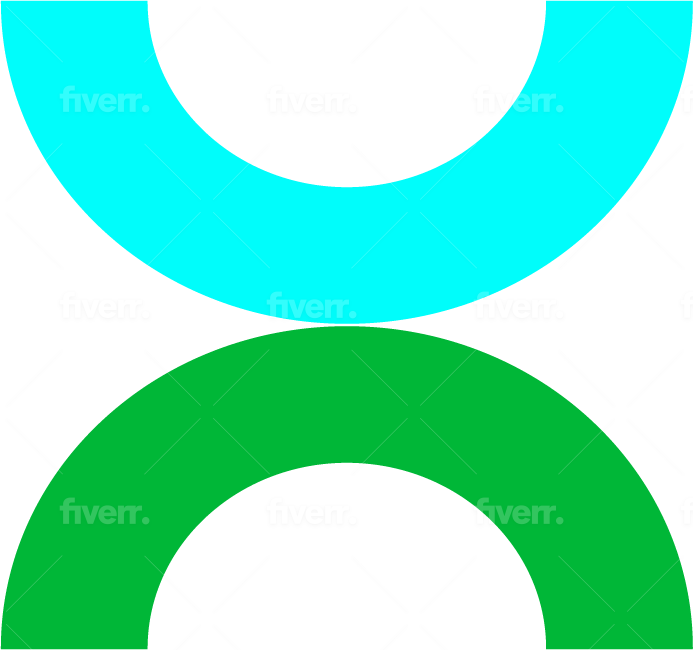



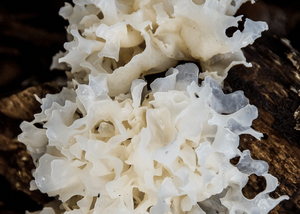

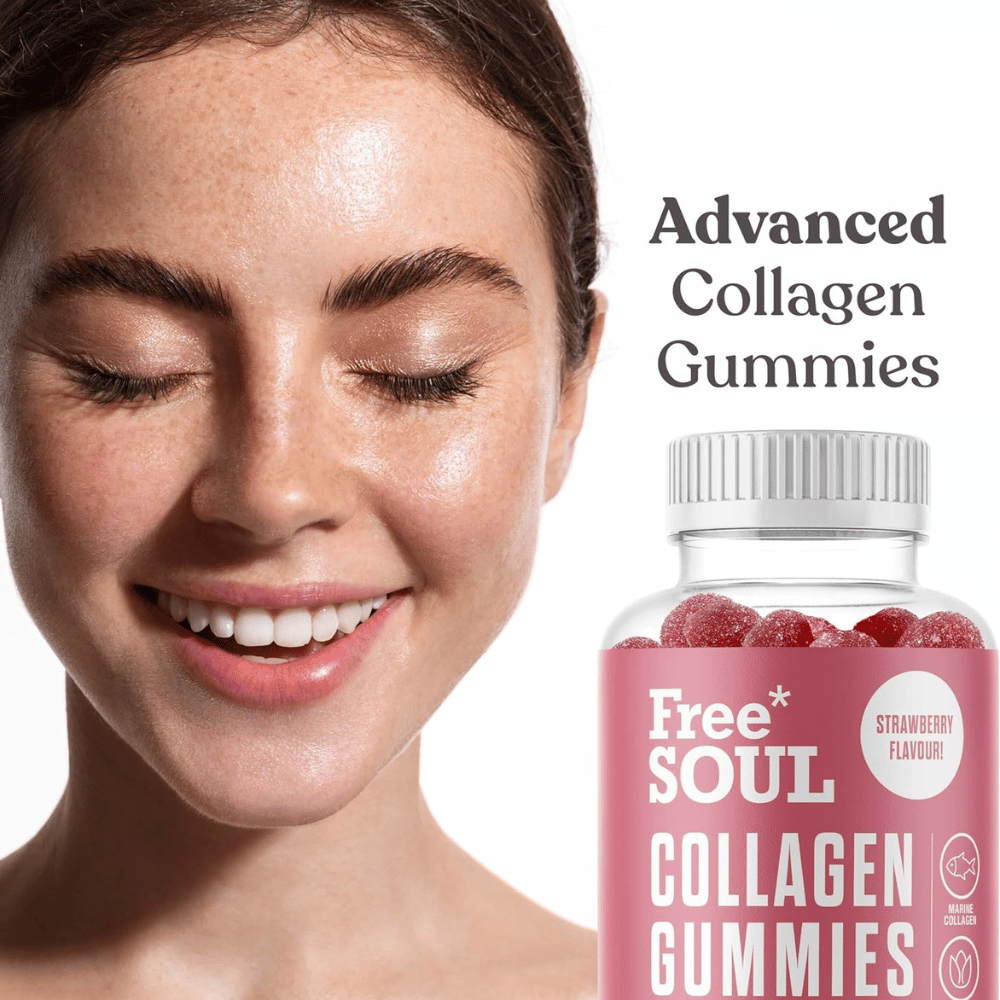




Member discussion